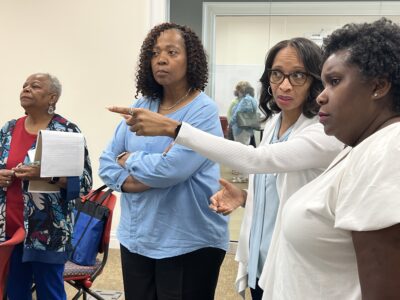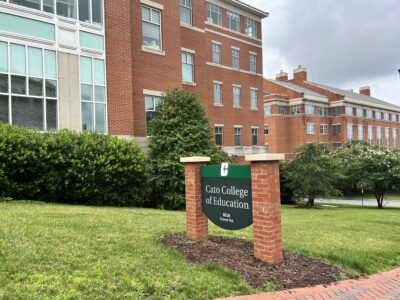

|
|
In the early days of the pandemic, the UNC System held a virtual, special meeting of its Board of Governors on an April day when the global COVID death toll surpassed 150,000. There were those once-familiar video conferencing hiccups – background noise, trouble with the roll call while navigating multiple screens, long pauses, confusion over who was speaking.
The urgency then centered on public health and learning a new, remote way of life.
Tucked in the middle of the hourlong meeting, lasting only about a minute, the board was presented with a resolution it would adopt later in the day – a resolution representing North Carolina’s first major policy swing toward the science of reading.
“I am very enthusiastic about this and appreciate the work you all are doing,” Board Chair Randy Ramsey said.
That was April 17, 2020. Less than three years later, enthusiasm had given way to frustration. With the urgency back on lagging reading scores, the governors reacted harshly to an update on a lack of progress among UNC institutions toward meeting the goals of the 2020 resolution.
“It is not my nature to shame,” Board Vice Chair Wendy Murphy said during the meeting in January, “but one college of education out of 15 being ‘strong’ is not enough. ‘Good’ is not good enough, and ‘needs improvement’ and ‘inadequate’ are unacceptable for the crown jewel of this great state.
“Why aren’t our colleges of education leading the way?”
Thing is, in an important way, they did lead the way. And in the process, they present an education reform case study of wanting to go fast for the benefit of children, but having to go slow for the sake of buy-in and fidelity.
“These kinds of reforms are difficult and take time, I agree with that,” Andrew Kelly, the UNC System’s senior vice president for strategy and policy, told EdNC last month. “I think the flip side of that, of course, is we don’t have a whole lot of time to waste – because we’ve got students who can’t read, and we have far more of them, it feels like, post-COVID than we did even in the past. And so we’re always trying to balance those two things.”
Starting the science of reading journey, before it was even called that
Looking back, the UNC System’s commitment to the science of reading happened relatively quickly.
In 2017, Margaret Spelling, who was then UNC System president, commissioned a group of experts in early literacy to explore the state of literacy curriculum and instruction for all students at UNC campuses. That marked the first shift of that breadth toward the science of reading in North Carolina.
That work resulted in a report calling for better alignment between UNC System educator preparation programs (EPPs) and school districts, increased field experience for teacher candidates, and more fidelity to evidence-based teaching practices.
“North Carolina must do better,” the report said. “We must educate more students to a higher level than ever before. That means recruiting and preparing more teachers who are equipped to succeed in today’s classrooms.”
In response, the UNC System convened an advisory group to prioritize its efforts to accelerate improvement in teacher preparation, with an initial focus on the teaching of reading. Representatives from five institutions – UNC Charlotte, Elon, UNC Pembroke, Western Carolina, and Winston-Salem State – met to provide recommendations to the system office.
Their report informed the 2020 resolution, which called for a common framework for literacy instruction in teacher preparation. That framework, created by eight literacy fellows, was adopted 10 months later, in February 2021.
About that time, the system obtained grants from the Goodnight Educational Foundation and C.D. Spangler Foundation that allowed it to fund training in Language Essentials for Teachers of Reading and Spelling (LETRS). The system also sub-granted some funds to launch literacy innovation projects at Appalachian State, Fayetteville State, North Carolina A&T State, UNC Charlotte, and UNC Pembroke.
Things were moving so quickly at the system, it beat the General Assembly’s 2021 reading law by two months. But while the policy shift happened rapidly, so too did the effort to measure compliance.
The General Assembly’s 2021 session also yielded the state’s first budget in three years, including a provision for the UNC System to submit for evaluation on its progress in complying with the shift to the science of reading.
So, less than a year later, third-party consultant TPI-US began the evaluation that would elicit the strong response from the Board of Governors.
For its part, the UNC System didn’t balk. It accepted the timeline and the board’s call to action.
“The sense of the board and the sense of the president, and those of us who work on this, is that we really should be farther along,” Kelly said.
The evaluation, the first since the system’s and state’s policy and legal mandates, painted a picture of inconsistency. It rated only one program as strong, five as good, and the remaining nine as needing significant work.
A case study in moving deliberately
The institution rated as strong was UNC Charlotte. Amid the urge to quickly change for the sake of students, here stood an example of how this might just take time.
“We’ve been working on it for 10 years,” said Erin Washburn, an associate professor at UNC Charlotte.
Shortly after Ellen McIntyre became dean of UNC Charlotte’s Cato College of Education in 2013, the program began making changes to better prepare its students to teach in alignment with the reading research. McIntyre, who served on the UNC System’s advisory group in 2019, left UNC Charlotte in 2020.
Under her tenure, and continuing under current dean Malcolm Butler, the college has increased its literacy course requirements from three to five, with an additional two offered as electives.
“And that required a lot of intention and a lot of thought,” Butler said.
Some of the biggest changes were in practice for future teachers. About eight years ago, the college began redesigning teaching opportunities (or clinical experiences) for candidates during summer reading camps. It later expanded them to the lab school on campus, Niner Elementary. In the past few years, the college has created partnerships with Charlotte-Mecklenburg Schools, such as Hornet’s Nest Elementary, and placed teacher candidates there for clinical opportunities.
“This work is about redesigning our coursework and enhancing our clinical experiences, so our teacher candidates are teaching children from Day 1 of their clinical experiences,” Washburn said. “We’re really trying to be thoughtful about how to build teacher candidates’ expertise from Day 1, so that by the time they graduate, they’re ready to take on anything in literacy.”
Change – psychological and practical – happens over time
But it took 10 years to get there – including strategic hires of people who had already bought into the changes. That doesn’t mean it should take that long, or even that the pace systemwide is necessarily as swift as it could be. It does suggest, however, that as quickly as the system and some institutions want to move, both the buy-in and action steps take some time.
Kristen Beach, an associate professor of special education at UNC Charlotte, said the research has long been clear that kids need to decode and gain background knowledge to work toward higher reading skills. She said it’s also clear that instruction hasn’t been effective at producing that. She said the disconnect, in part, tracks back to disagreement over the research and how best to teach it.
“All of that knowledge does not necessarily exist in schools, or in teachers, not necessarily all of the schools and the teachers,” she said. “But (that’s) because colleges of education have not historically all been teaching teachers how to align with the science of reading.”
The TPI-US evaluation showed mass inconsistency in how UNC System institutions prepare reading teachers. But that was a measure taken less than a year into implementation. More recently, UNC System President Peter Hans has sensed something different.
“It’s been interesting to me, whether it’s our faculty or whether it’s the teachers in the field, how many have embraced it,” he said. “And how many are still working at it. And we want to make sure that we’re there for them. Because that’s what’s best for the children.”
And with more time, as well as the feedback from the evaluators, that anecdotal shift seems poised to show up in objective measurement.
A turning tide?
Real excellence, Kelly says, is about paper compliance and practice. Paper compliance is making sure the institutions have written out all of the requirements they should cover. Practice is seeing that consistently carried out.
The UNC System is first focused on paper compliance.
According to the evaluation, “each institution should ensure that literacy courses are not taught in silos by taking steps to see that all literacy standards are mapped out and addressed across courses and that literacy coursework is planned and delivered as a well-thought-out trajectory of courses that build upon one another thoughtfully and intentionally.”
After hearing the evaluation report and the resolution from the Board of Governors, the System Office funded an extension of the TPI-US engagement to provide each of the 14 campuses rated “good” or below with detailed, annotated reports for each course reviewed.
These reports included a detailed description of the areas that need improvement, the strengths of the course, and suggested additions (including links to readings and other materials that the reviewers would recommend). TPI-US also provided direct technical assistance to programs through virtual office hours with individual EPPs.
The Board of Governors tasked these 14 EPPs with addressing deficiencies found in the evaluation and submitting evidence of corrective measures.
The system office received those submissions on July 1 and asked six reviewers from the University of Virginia and Texas A&M University to review them. The Board of Governors is expected to hear findings from that review in mid-September.
“I think the good news is, just to preview, I think we’re seeing progress,” Kelly said.
Kelly’s preview isn’t just from his review of the raw data sent to Virginia and Texas A&M. It’s also from a report that was published in the interim by the National Council on Teacher Quality, which conducted its nationwide evaluation of literacy preparation at colleges and universities. That report, published in June, gave eight UNC System institutions an A. Half of all North Carolina colleges of education received an A, more than double the national rate of 23%.
The council highlighted 48 “exemplary” programs, including five in North Carolina. Four of them — UNC Chapel Hill, UNC Asheville, East Carolina, and Western Carolina — were UNC System programs.
The highlights, Kelly said, foreshadow the progress UNC institutions have made since TPI-US gathered its data in 2022.
“That’s not just a function of, you know, different methods disagreeing with one another,” Kelly said. “That is a measure of the steps those programs have taken to align with the science of reading.”
Kelly said he doesn’t think it’s unfair for the Board of Governors to want member institutions to be further along — the stakes are high, and the system has been moving in this direction for many years now. Besides, he thinks the system can meet high standards.
“I don’t know of a system that has gotten this piece entirely right yet,” he said. “And I like to think that we’re going to be the one — we are poised to be the system that does it and hopefully can serve as a model for the rest of the country.”





